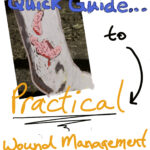Vet myths
| April 24, 2022 | Posted by Melinda under Uncategorized |
I’m writing a new book!!!! It’s in the early stages and I don’t know *exactly* what form it’s going to take…but it’s vetmed related. So, to celebrate I’m writing a post about the biggest myths I see every day in the clinic.
Fleas
People are personally offended when I tell them their pet has fleas. Or that they have a flea allergy (no, these two aren’t one and the same).
I’ve been screamed at more often over fleas than anything else.
If you don’t see them then they can’t be the cause of your pet’s itchy skin. Myth.
If you use prevention, they can’t be the cause of your pet’s itchy skin. Myth.
You can use prevention and it can not work for a variety of reasons. Your pet can react to fleas that bite and then leave without you seeing them. Your pet can have fleas even though they never go outside. Your pet can have itchy skin because of fleas and you never see a single flea in your house.
Sometimes, I’ll find fleas or evidence of fleas on your pet, because I’m really really really motivated to find them – more motivated than you are – because I’ve just been screamed at by you that it’s impossible that it’s fleas….but the pet in front of me is a walking, talking, itching example of a flea allergy.
And since I know where and how to look, I’ll find it and I’ll show you, and you won’t apologize…but you usually stop dreaming at me and that’s nice.
Here’s the thing.
If we suspect skin allergies (“atopy”) then it’s standard protocol to put the pet on a really good flea medication.
I know it’s not sexy and it’s not what you want…but look at it this way. A flea allergy is GOOD news. All the other things it could be are going to require more money to diagnose and manage. I mean, I guess we can start with a strict 6-8 week food trial on expensive prescription limited ingredient or hydrolyzed food. Or perform a skin test for environmental allergies at the local dermatologist. Or give drugs that are expensive and may or may not work if the underlying allergies is fleas or food.
So, if your dog looks like it has a flea allergy, let’s start with flea medication. If it doesn’t resolve, we will take the next stop.
Dermatology problems are rarely a “fix it in one visit” sort of thing. Sorry. Everything sorta looks like everything else, a lot of the problems are chronic and need to be managed, and getting it right can mean the difference between a happy pet and miserable one.
Noses
If you come to me in the ER with the complaint that you know something is wrong because your dog’s nose is wet/dry/cold/warm I am going to judge you and triage you to the back of the line unless there’s *something else* wrong too.
Unless the nose is moist because of bleeding, dry because of horny growths, or warm because it blistered it on the stove….the temperature and moistness of your dog’s nose isn’t something that goes on the problem list.
It doesn’t mean that something isn’t wrong with your pet, and that may be the only thing you can point at to justify the difference you feel in your gut…..but NO YOUR DOG’S NOSE ISN’T TELLING YOU ANYTHING.
Also your pet’s grass eating habits.
Meaningless, no matter what your aunt told you.
What I want to know: Is your animal vomiting (how often, what the vomitus looks like, and bonus video if you have it so I can determine whether it’s regurgitation or true vomiting), what it’s stools look like, what they are eating (how much, what kind, any changes), how much they are drinking, how often they are urinating.
But no. They want to talk about the nose, and when I ask about diarrhea they wave their hands casually and say they don’t know because there’s three dogs and she doesn’t watch them that closely.
*Me slowly dying one conversation at a time*
Crystal balls
Contrary to what most seem to think, I do not have a crystal ball.
I cannot tell you what is wrong without tests (well, sometimes I can, but if I’m telling you I don’t know what’s wrong and we need some tests, it’s because I don’t know).
I cannot tell you whether your pet will survive or not (I can tell you prognosis and sometimes even give you percentages but I don’t know which side your pet will be on).
I cannot tell you whether your pet will be the one to have some idiosyncratic reaction to a drug or anesthesia.
I cannot tell you how many years your pet will live if you decide to pay all that money to save his life tonight.
Sometimes I can tell you what will happen if you do not treat (mostly terrible awful ways of dying) but mostly you take your chances with the future just like all of us and pray that your pet is on the “right” side of the statistics.
Cats vomit “normally”
I don’t care that your “healthy” old skinny cat that has “suddenly” become ill three days ago, has a “normal” vomiting habit every week for the last 15 years. It’s still abnormal and needs to be considered since it’s probably relevant to its problem today.
Vomiting is abnormal for cats (yes, even long-haired ones) if it occurs on a regular basis. No, it’s not just a hair ball. Maybe that’s what you see on your carpet (or on your bare feet, if your cat ownership experience is anything like mine) but coughing up hair balls is not why they are vomiting. Most of the time it’s something nebulously abnormal in their GI tract.
Cat hair should pass through the GI tract, like some gross form of extra dietary fiber, not get coughed up like an owl pellet.
Fix the pain
Your older dog isn’t slowing down. He’s in pain from arthritis. He’s not getting stiffer, it hurts to move.
There’s drugs for that.
While we are on the topic, being pain won’t help your pet rest and heal better after surgery or a procedure. Pain and inflammation inhibits healing. Yes, maybe vetmed thought differently back in the day. But, when you know better, do better.
If we can’t control pain at home with oral drugs, that’s one indication they should be hospitalized.
Hybrid vigor
No one pays attention in biology class. Except for the stuff they remember and then that’s what they cling to harder than a rubber raft in the middle of the ocean of circling sharks.
Hybrid vigor.
It doesn’t mean what you think it means when it comes to dog breeds.
Your dog isn’t going to live longer because you decided to breed a husky and shepherd together.
Your doodle isn’t going to have less health problems because you decided to combine two breeds together.
That stray that came into your yard isn’t protected from cancer because it looks like 14 different breeds of dogs and also no breed at all.
There are a lot of different studies that look at life spans between mixed breed and purebred dogs. As you are reading this you may be googling “do mixed breed dogs live longer than purebreds? and be rewarded by a top result from petmd touting that indeed mixed breeds live significantly longer! The problem is this question is a charged non-neutral question for many organizations and political movements. It’s also not a straightforward questions.
Large dogs live shorter lives than small dogs (statistically). Dogs with higher inbred coeffieicents live shorter lives than less inbred dogs (statistically). High inbred coefficients aren’t present in all purebred dogs, and are not absent in all mixed breed dogs. Outcrossing is important, but simply breeding 2 dogs from different established “breeds” isn’t going to guarantee off-spring that have won the genetic lottery or produce a superior product.
Then there is the sticky problem of applying statistics form a population to your dog in front of us. Just because the statistics say that your mixed breed medium dog should not have “as high” a risk of hip dysplasia or a hemangiosarcoma doesn’t change the fact that they do in fact have that when you come see me on a Saturday night. Population statistics are useful for figuring out how things work and for making big picture decisions. They don’t matter much when I have a pale dog with a big fluid abdomen and you are trying to decide whether to do surgery or not.
A picture is worth a thousand words
But….I still can’t make a diagnosis based off it (most of the time). Is that post abdominal incision swelling a seroma or a hernia? Don’t know. Gotta come in.
Is that limp because it has a foxtail, bone cancer, or a soft tissue sprain? Don’t know. Gotta come in.
Do I need a steroid or an antibiotic for these ears? Don’t know. Gotta come in. (and no. This isn’t an emergency room come in. It can wait for your GP).
How deep is this wound and does it need stitches? Don’t know. Gotta come in.
Here’s a picture of a pile of diarrhea and a pile of vomit. What’s wrong with my dog? Don’t know. Gotta come in. Because….this is:
What you are actually paying for
When you come into the ER you pay for a physical exam. With a good history and a hands on physical exam it’s amazing what I can do. Not everything….most things still need an additional diagnostics, or procedures, but it’s absolutely amazing how far we can get with just those initial things.
Yes, I know if feels like paying some sort of entrance fee just to get your pet through the door so I can tell you that you need to spend even more money. But usually if that isn’t an option, I can still do something. I can treat symptoms, relieve pain, or maybe give you peace of mind.
Seeing a picture and hearing your history isn’t enough without seeing the patient too. I may have some really good ideas of what is going on….and true, my hands-on exam may not change my mind…but there’s plenty of cases where it has! And sometimes we would have really screwed up just going on a gut feeling and some assumptions without the patient there.
I’ve talked on this blog before about the invisible costs you are paying for when you pay for the “exam fee” at the vet. Why something that looks like it could be free isn’t. Read the “self-medicating” chapter of this post for an example of all the extra unseen stuff that goes into something as simple as deciding what medication to use. Just please remember that “I’m not trying to be snarky. It’s not like just by the virtue of being a vet that I have some sort of special bank of knowledge that I refuse to share with you, just to force you to come to the clinic so I can charge you money.” This goes for the physical exam and initial evaluation as well.
Leaving the legalities of diagnosing and treating your pet over the phone aside, most of the time it’s not that I won’t make a diagnosis that way…. I can’t make one with any degree of confidence. By letting me see your pet in the clinic and paying the fee, you are in fact paying for a diagnostic – me and my hands and the interpretation of that test.
I know it doesn’t feel like that. You are paying money for something that isn’t sexy and doesn’t look that cool, and probably does look like I could have just closed my eyes and channeled whatever I’m saying to you and your pet at home, over the phone.
The other sticky point about all this that muddles the whole picture of legal requirements/what I am or not willing to do outside of an actual real to goodness in person exam is that seems to be difficult for this society to understand is that veterinary medicine is a professional service.
Oooohhhhh that’s a can of worms.
Vetmed should be free because we all care about animals
Or because it is viewed as a necessary service by those that need it. Often to those that need it, they feel it should be provided for free if the owner cannot afford it.
Well, in for a penny, in for a pound. Let’s talk about this.
Veterinary medicine is a professional service.
Yes, it’s complicated because historically vetmed is closely connected to public health, food production, and (increasingly) taking care of living things that share our lives
Over the history of humanity animals have been intwined in our survival. As food, beasts of burden, tools, and yes – companions. Now many of the animals getting veterinary care are increasingly the latter, but I think some of us are hardwired to internalize our connection to a pet as necessary for survival because animals have meant so much to us over the ages.
So, it can be really hard to hear that I *could* help your animal if you had the money.
But that I won’t, if you don’t.
Or find out that I won’t give you advice or talk to you about your animal at length for free. Why won’t I give you that expertise that doesn’t cost me anything except just a little bit of time?
I’ll repeat. Veterinary medicine is a professional service.
I really really like working in veterinary medicine. It’s fun, it’s challenging, and it’s meaningful work.
Just because those things are true doesn’t mean I’m obligated to give away those services for free.
Part of the story is that I can’t. It costs a lot of money to become a vet and then continue to be a vet.
I paid a pretty penny in order to be able to provide those services. Despite what you may be hearing on the news about student loans, most of us are paying back every cent we initially borrowed, plus a whole lot more, over most/all of our working careers.
Providing these services costs me a lot of money every year, beyond the initial education. Insurance, licensing, continuing education, supplies, equipment, and everything else that keeps me practicing good medicine.
Who should have to pay that? Do you buy a house and then rent it out for free because it’s a nice house and lots of people want to live there?
I have a mortgage on that house. Who pays that mortgage (my student loan, if you aren’t following that analogy) if the renters don’t?
Maybe the government should? I can hear it now… “You work for the government and they pay off your student loan! Problem solved, you can practice vetmed for less and I pay less for my vet care!”
But, here’s the a deal….(beyond the fact that government pays its vets sh*t and it’s a 10 year commitment which does not pencil out on paper).
The emergency clinic the client showed up to, demanding that we do surgery to fix the pyometra on their dog “or else,” isn’t a government run clinic, because the government doesn’t have clinics that will treat the dog’s pyometra. They don’t care about the dog’s pyometra. They care about public health and food safety.
So if we want vets to practice emergency medicine and be there for us, at 2am, with a pyometra it’s going to be those of us that don’t work for the government. Which means the clients are footing the cost of what it takes to become a veterinarian.
But finances are only a part of it.
Continuing our use of bad analogies, I spend a lot of time working. I have precious little free time for myself and my family. Using that free time to give free advice about diets, weight loss, worms, or whether someone’s dog is walking funny on a video is not mentally sustainable. Can you imagine calling your plumber while they’re at Disneyland because you just had a question whether your sink was draining correctly and if not, what could it be and can you buy the part at home depot? (Yes, my days off feel like Disneyland because I get so few of them. )
It’s never a 5 minute conversation to “just provide a second opinion,” or “what do you think this is?” It’s a mental exercise in looking at the situation from several different angles, creating a list of most likely differentials, creating a reasonable diagnostic/treatment algorithm, double checking whether there have been recent changes to recommendations or treatments for that condition, explaining the risk/benefit of various options to the owner, verifying understanding of the treatment, and then completing any follow up.
I have learned over the years that people value advice in proportion to what they pay for it. Being paid for my time helps me not resent the time I spent answering your question when you inevitably ignore my advice and then ask me the same question two years later.
And then there’s the fact that it doesn’t matter whether the advice was free or not, I’m still liable for practicing medicine in any context. Including a text message with some random stranger or friend. Providing free advice is not worth the stress for future-Mel when I’ve given bad advice based on having an incomplete clinical picture.
There’s good news. Just like other professional services, most vets do provide an initial evaluation for free.
It’s called a triage.
People worried about their pets can call our clinics and explain the problem and the staff will let them know whether we think they should come in right away, or if it can wait. If it’s a general practice clinic and they have an ongoing relationship with the vet, they might even be able to get a call back from the vet to help decide whether they need to come into the clinic or not.
Triage is my personal answer to, and my compromise for, responding to vet-related stuff outside of my working hours.
You can love a job, and also not want to be that job. You can help people, but also have boundaries between what you can give and what needs to be protected so you can give later. These are not contradictions.
It a myth that vets become vets and stay vets because they love animals. True, most of us feel some connection to animals, their people, or their role in society, and that is an important aspect in choosing this career….but we can’t eat, pay or bills, or exist based solely on that passion.










